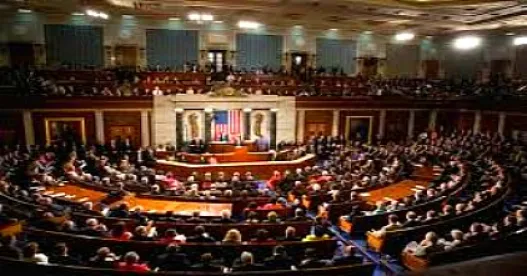Democrats Begin Process of Enacting Administration’s Domestic Goals. It took some good old-fashioned politicking, but earlier this week the U.S. House of Representatives approved a $3.5 trillion budget resolution that will kick-start the reconciliation process in both the U.S. Senate and the House. Democrats intend to use this filibuster-proof process to enact provisions from President Joe Biden’s American Jobs Plan and American Families Plan. These provisions could include paid family and medical leave, increased penalties on employers that violate federal labor law, and lawful permanent status for Dreamers and Temporary Protected Status recipients.
House Democrats hope to have this legislative package drafted by the end of September and vote on it shortly thereafter. This timing roughly coincides with a promise to vote in the House on the bipartisan “hard” infrastructure bill (funding construction of things such as roads and bridges) that passed the Senate earlier in August 2021. Of course, in Congress it takes two (chambers) to tango. So even if the reconciliation bill makes it through the House, it still has to pass the Senate, where Senator Kyrsten Sinema (D-AZ) has already indicated that she is not keen on the bill, or at least its $3.5 trillion price tag. Stay tuned.
NLRB: Changes Coming. Today, August 27, 2021, is the final day of National Labor Relations Board (NLRB) Member William Emanuel’s term. David Prouty, who has already been confirmed by the U.S. Senate to replace Emanuel, is expected to be sworn in shortly. At that time, Democrats (Chair Lauren McFerran, and members Gwynne Wilcox and Prouty) will outnumber Republicans (members John Ring and Marvin Kaplan) and will thus flip the majority at the Board. Employers can therefore expect the policy pendulum at the Board to begin swinging back this fall.
Wage and Hour Proposals Docket Deadline. Comment periods for two of the U.S. Department of Labor’s (DOL) wage and hour regulatory proposals came to a close this week.
-
First, August 23, 2021, was the due date for submitting comments in response to the DOL’s proposal to codify in its regulations the so-called “80/20” rule for employees earning tips. Among those filing comments was the S. Chamber of Commerce, which encouraged the DOL to withdraw the proposal because it “improperly eviscerates the [Fair Labor Standards Act] tip credit as prescribed by Congress, would increase compliance costs for employers by making the tip credit nearly impossible to administer, and could potentially result in less take home pay for employees in tipped occupations.”
-
Second, August 23, 2021, was also the deadline for interested stakeholders to submit comments in response to the DOL’s proposed rulemaking implementing the president’s executive order requiring an increase in the minimum wage for certain employees of federal contractors.
The next step in the process for both proposals (after a stop at the White House’s Office of Information and Regulatory Affairs) is finalization, but there is no indication of when that might happen for either proposal.
SEC to Require Employers to Disclose HR-Related Info? The Buzz does not discuss the U.S. Securities and Exchange Commission (SEC) that often, but a recent development caught our eye. SEC Chairman Gary Gensler tweeted that he had asked his staff “to propose recommendations for the Commission’s consideration on human capital disclosure.” In a subsequent tweet, he stated that recommendations “could include a number of metrics, such as workforce turnover, skills and development training, compensation, benefits, workforce demographics including diversity, and health and safety.” Gensler’s statements seem to align with the SEC’s entry in the Spring Regulatory Agenda to propose in October 2021 a human capital management disclosure rule “to enhance registrant disclosures regarding human capital management.”
USCIS to Define “Public Charge.” On August 23, 2021, U.S. Citizenship and Immigration Services (USCIS) published an advance notice of proposed rulemaking (ANPRM) “to seek broad public feedback on the public charge ground of inadmissibility that will inform its development of a future regulatory proposal.” More specifically, and in anticipation of future rulemaking, the proposal solicits feedback on the data and factors that USCIS should use to define the phrase “public charge” as it is used in inadmissibility determinations. Comments are due on or before October 22, 2021.
State of Franklin. Two hundred thirty-seven years ago this week, the State of Franklin was born. In August 1784, the state of North Carolina ceded portions of its western territory to the U.S. Congress as a way to chip away at the large debt North Carolina had assumed during the Revolutionary War. But when Congress dithered in accepting the cession, North Carolina rescinded the offer, leaving its western territory feeling rather unwanted. As a result, on August 23, 1784, four counties located in western North Carolina (all are now located in Tennessee) declared their independence as the state of Frankland.
Although seven states voted to approve Frankland’s petition to become the 14th state, this was less than the two-thirds majority needed to add states pursuant to the Articles of Confederation. Frankland citizens then changed the name of their region to “Franklin” to curry favor with Benjamin Franklin, in hopes that the association would benefit their statehood cause. (It didn’t.) For about four years thereafter, Franklin existed as an independent state; it had its own constitution, made treaties with Native American tribes in the area, and established barter as its economic system. Eventually, frontier hostilities led Franklin back to North Carolina for protection. While its statehood gambit failed, the State of Franklin played an important role in expanding the country and admitting states into the Union. With the Franklin situation in mind, while drafting the U.S. Constitution just a few years later, the framers included Article 4, Section 3, sometimes referred to as the “Admissions Clause,” which states that “no new States shall be formed or erected within the Jurisdiction of any other State.”




 />i
/>i

